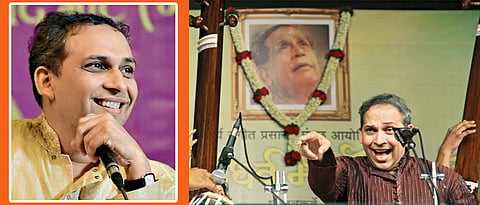

The doyen of Kirana gharana, late Pt Bhimsen Joshi enriched the Indian classical music with his renditions of devotional music like abhang and kirtan. And, with his promising disciple, Pt Anand Bhate being felicitated with this year’s Vaishnav Puraskar by the Warkari community, the tradition flourishes. The award, consisting of Rs 11,000 and a citation, will be presented to the vocalist on Friday evening during Namacha Gajar, a devotional music programme.
The Vaishnav Puraskar has been instituted in the memory of Vishwanath Maharaj Ingale, a renowned name in Warkari community. Bhate says, “It feels good to receive this award. We have a rich tradition of abhangs in Indian music, which were written and sung by various saints. The literature on spirituality and social aspects, written centuries ago, holds good even today. As a singer, through our music we seek and worship Lord Vitthal.”
REMINISCING HIS GURUS
Pt Bhate’s journey in classical music started in his childhood. Speaking about his gurus, Bhate says, “I have been extremely fortunate to learn from great gurus since the beginning. I have a legacy of natya sangeet and classical music from my great grandfather, Bhatebua. He was best known for his renditions in thumri and natya sangeet. My first guru, Chandrashekhar Deshpande taught me songs, originally sung by Bal Gandharva. Parallely, I also started learning classical music from Yashwant Marathe, who gave me a strong foundation. It prepared me to take further training under
Pt Bhimsen Joshi. All of them have a special place in my life.”
When a guru shows utmost trust in a disciple, it puts the seeker in a more responsible position. Bhate experienced a similar emotion when in one of the documentaries, Pt Joshi said that his legacy will be carried forward by Bhate.
“In that documentary by Films Division, Panditji had said ‘Yeh Anand Bhate hai. Ispe mujhe bharosa hai aur isme gayan seekhne ki takat achchi hai’. I felt more responsible and I was also satisfied that I was on the right track. When I was learning from him, I would experience ‘Swara Siddhi’ or divinity. I saw what it means to surrender to the swaras in the music,” he says.
Talking more about his relationship with Pt Joshi, Bhate says, “In the ’90s, Panditji was going perform Raag Darbari Kanada in Sawai Gandharva Mahotsav. We students were in the green room setting up the tanpura. Panditji came and rehearsed his opening chords. At that moment, everything stood still, the atmosphere was set. This experience is still fresh in my mind.”
THE TRADITION WILL CONTINUE
One thinks that what Bhate shared and learnt from his gurus is something which will be difficult to recreate in the tech-driven era. However, Bhate points out, “There are many who still follow this traditional way of teaching, especially those who want to accomplish their long term goals. Also, there are gurus who teach with equal passion. The only change that can be seen is that unlike earlier days, students may not stay at their guru’s house. There are some people who want quick results, but in classical music, it is very important to stay focused and follow the guru’s instructions.”
Without discrediting the technological advancement, he adds, “In a way, learning through digital medium is good. Those who are living in remote areas can benefit from this. There are good students in different countries who want to learn, they make the most of digital learning. Learning through technology can compensate for the learning process but cannot replace the optimal and face-to-face learning from the guru.”
Over the years, many trends were introduced in classical music. Bhate, who has been observing them, says, “Presentation has changed over a period of time. Earlier, there were overnight mehfils, but in today’s fast paced lifestyle, the duration of music concerts has reduced. The trends may come and go, what is important is to maintain the crux or the basics of the music.”
ST READER SERVICE
Namacha Gajar programme will be held on July 5 from 5.30 pm onwards at MES Balshikshan Auditorium, Kothrud. The programme is non-ticketed.
